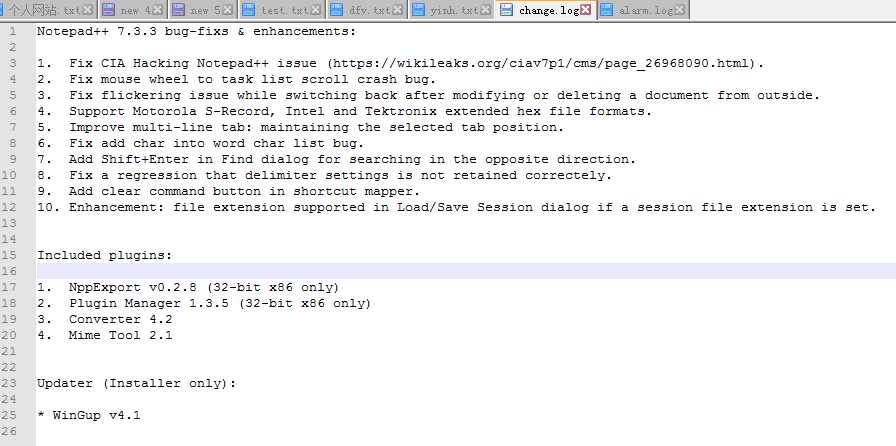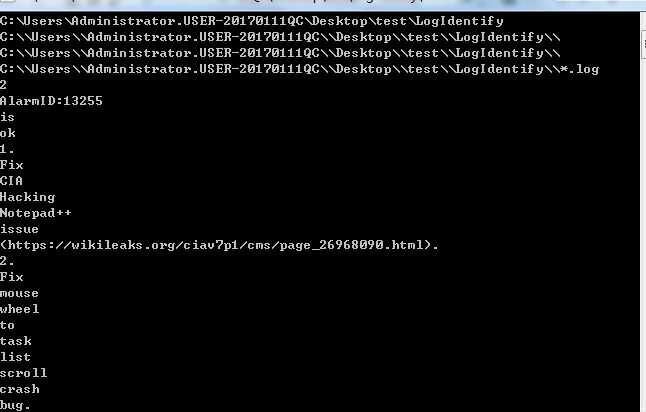标签:ted ges 源码 查看 缓存 性能 strlen 文件 stroke
简单的日志定位系统----读取exe执行文件路径下指定格式的文件内容,根据日志关键字输出指定结果,实现简单问题定位
步骤很简单:
1、clock()函数,用来计时,看性能几何
2、动态获取当前执行文件路径
3、分割‘路径‘字符串,再重新组装,boost库有现成的split函数,也可以用stroke函数自己实现
4、类型转换,路径要换成wstring类型
5、找寻路径下指定格式的所有文件
6、读取文件内容放入缓存
7、业务逻辑处理,根据日志关键字输出指定结果
8、结束
下面代码只是最原始的,业务逻辑处理没有示例,代码本身也是面向程序的,有很多地方为了易懂,有点重复,只是实现了其功能
#include <iostream> #include <fstream> #include <string> #include <vector> #include <windows.h> #include <boost/algorithm/string/split.hpp> #include <boost/algorithm/string/classification.hpp> //is_any_of using namespace std; int main() { clock_t Tstart,Tend; Tstart = clock(); string strPath; //动态执行程序路径 vector<string> everyPath; //存放每一级目录 string sPath = ""; //拼装后string路径 wstring wsPath = L""; //wstring完整路径 wstring wsFullPath = L""; //wstring完整路径和文件名(实际是*的文件名) wstring wsTrueFullPath = L""; //wstring真正完整路径和文件名 vector<wstring> vecEveryFile; //某目录下的所有指定格式的文件 vector<wstring> vecFullFile; //满足条件的文件名的绝对路径 vector<string> vecFileContent; //存放每一级目录 string strFileContent; int nFileCount = 0; char chpath[100]; GetCurrentDirectory(MAX_PATH,chpath); strPath = chpath; cout << strPath << endl; boost::split(everyPath,strPath,boost::is_any_of(",\\"),boost::token_compress_on); for(vector<string>::iterator iter= everyPath.begin();iter!= everyPath.end();iter++) { string stempPath = *iter; sPath = sPath + stempPath + "\\" + "\\" ; } cout << sPath << endl; const char* chPath = sPath.c_str(); size_t iPathNum = strlen(chPath) +1 ; const size_t newSize = 100; size_t convertedChars = 0; wchar_t wNewstring[newSize]; mbstowcs_s(&convertedChars,wNewstring,iPathNum,chPath,_TRUNCATE); wsPath = wNewstring; wcout << wsPath << endl; wsFullPath = wsPath + L"*.log"; wcout << wsFullPath << endl; _wfinddata_t fileInfo; long handle = _wfindfirst(wsFullPath.c_str(),&fileInfo); if( -1 == handle) { cout << nFileCount << endl; Tend = clock(); double duration = (double)(Tend - Tstart); cout << "can not find the log" << endl; cout << duration << endl; return 0; } do { nFileCount ++; wstring wTempFile = fileInfo.name; vecEveryFile.push_back(wTempFile); }while( _wfindnext(handle,&fileInfo)==0 ); cout << nFileCount << endl; for(vector<wstring>::iterator iter = vecEveryFile.begin();iter != vecEveryFile.end();iter ++) { wstring wtempFilename1 = *iter; wstring wFullFileName = wsPath+wtempFilename1; vecFullFile.push_back(wFullFileName); } for(vector<wstring>::iterator iter = vecFullFile.begin();iter != vecFullFile.end();iter ++) { ifstream infile(*iter); while( infile >> strFileContent) { vecFileContent.push_back(strFileContent); } } //这边只是查看exe路径下的文件内容是否全部读取到缓存,实际的话根绝日志关键字输出不同的内容既可以 for(vector<string>::iterator iter = vecFileContent.begin();iter != vecFileContent.end();iter ++) { cout << *iter << endl; } Tend = clock(); double duration = (double)(Tend - Tstart); cout << duration << endl; system("PAUSE"); return 0; }
在file.exe的路劲下放入了alarm.log和trap.log,内容如下



file.exe的执行结果如下,成功将俩个日志文件的内容读入到缓存中,真正的日志定位系统还要实现对缓存内数据的处理,根据不同的值要输出不同的值到界面,让看不懂日志的人只需要执行一下exe文件,直接看输出就可以

标签:ted ges 源码 查看 缓存 性能 strlen 文件 stroke
原文地址:http://www.cnblogs.com/effortscodepanda/p/6613615.html